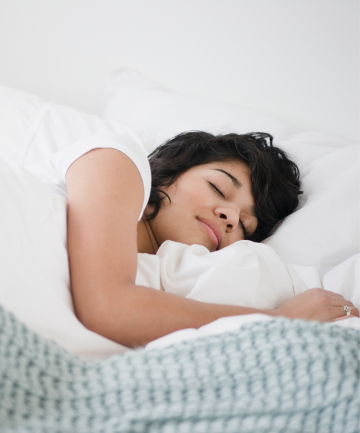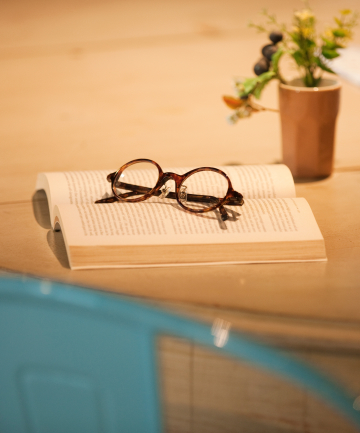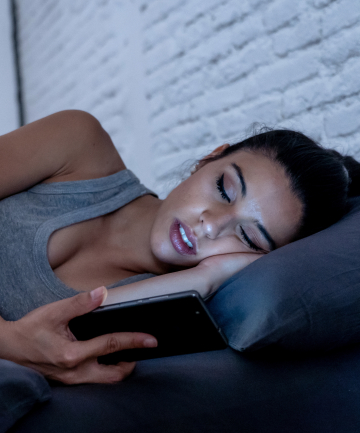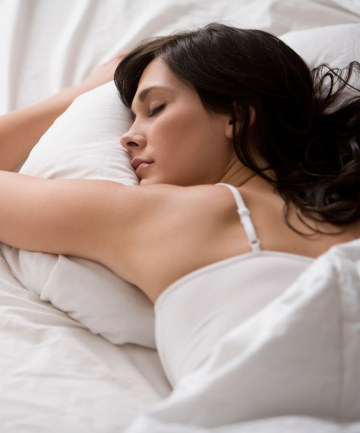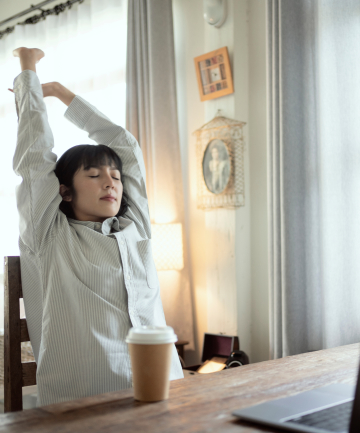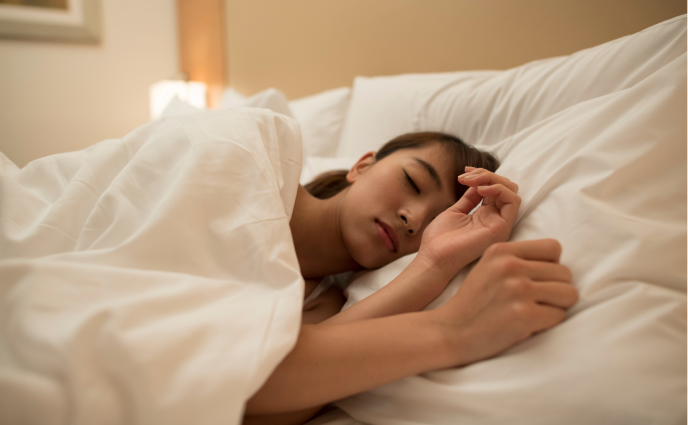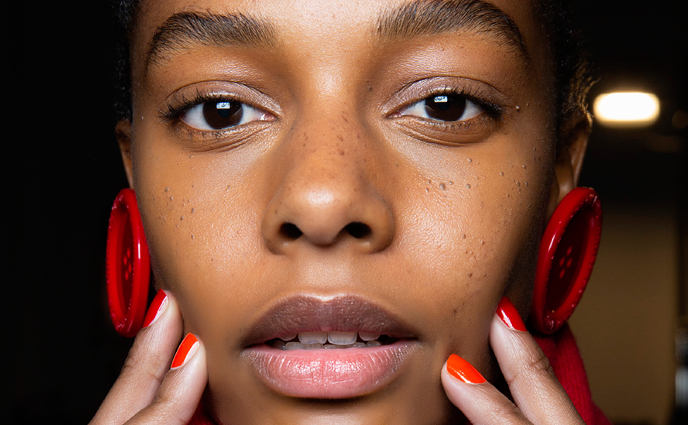All the caffeine in a well-stocked artisan coffee shop will not make up for a good night's sleep (well, almost, but no cigar). The simple truth is, we humans need sleep, just like we need food and water. Without sufficient shuteye, countless areas of our lives suffer (as anyone who is currently dealing with disturbed sleep can probably attest).
The COVID-19 pandemic has caused all sorts of unforeseen changes in our lives, including our sleep habits. Even those who fall asleep fairly easily might be plagued by unusual, vivid and sometimes straight-up bizarre dreams, if not nightmares.
Click ahead to see the easy expert-approved tips on how to have a more restful sleep.
Image via JGI/Jamie Grill/Getty
The COVID-19 pandemic has caused all sorts of unforeseen changes in our lives, including our sleep habits. Even those who fall asleep fairly easily might be plagued by unusual, vivid and sometimes straight-up bizarre dreams, if not nightmares.
Click ahead to see the easy expert-approved tips on how to have a more restful sleep.
Image via JGI/Jamie Grill/Getty
"In my opinion, a regulated circadian rhythm is most important for high quality sleep and overnight restoration," says Jessica Hoyer, founder of Bynacht. "This 'inner clock' steers and regulates many processes in the body, first and foremost the release of melatonin — known as the 'sleep hormone.'"
Creating a bedtime routine is a great place to start: "Try to do the same thing each night in the same order," says Rebecca Newman, MSW, LCSW, a psychotherapist based in Philadelphia. "It will help signal your brain that you're getting ready for sleep and winding down."
Make your bedtime routine a proper ritual — perhaps with a bubble bath, relaxing playlist or favorite book. A regular routine can include simple things like brushing your teeth and doing a p.m. skin care regimen, putting clothes away or picking out an outfit for the next day, having a soothing bath, reading, journaling, mediating or using an essential oil diffuser. At least 30 minutes of solo time before going to bed should lead to a noticeable easing into sleep, according to Hoyer.
Newman suggests setting an alarm to remind yourself that it's time to start your evening routine. It can be the signal to power down screens and devices, get into your PJs and start your rituals, such as those listed previously.
Image via a-clip/Getty
Creating a bedtime routine is a great place to start: "Try to do the same thing each night in the same order," says Rebecca Newman, MSW, LCSW, a psychotherapist based in Philadelphia. "It will help signal your brain that you're getting ready for sleep and winding down."
Make your bedtime routine a proper ritual — perhaps with a bubble bath, relaxing playlist or favorite book. A regular routine can include simple things like brushing your teeth and doing a p.m. skin care regimen, putting clothes away or picking out an outfit for the next day, having a soothing bath, reading, journaling, mediating or using an essential oil diffuser. At least 30 minutes of solo time before going to bed should lead to a noticeable easing into sleep, according to Hoyer.
Newman suggests setting an alarm to remind yourself that it's time to start your evening routine. It can be the signal to power down screens and devices, get into your PJs and start your rituals, such as those listed previously.
Image via a-clip/Getty
It might seem incredibly obvious but an important part of a routine should be actually going to bed when you're sleepy, according to Alcibiades Rodriguez, MD, director of the Sleep Center at NYU Langone Health.
Similarly, try to get up at the same time every day: Hoyer says that this helps maintain an intact circadian rhythm.
Image via sam thomas/Getty
Similarly, try to get up at the same time every day: Hoyer says that this helps maintain an intact circadian rhythm.
Image via sam thomas/Getty
Consider Bedroom Temperature: The climate of your sleeping space makes a huge difference. For optimal sleep, Newman says that the ambient temperature should be slightly cool, with warm covers.
Create an Enjoyable Sleep Space: Take a look at your sleeping space. Is it calming? Do you like your sheets and blankets? Is your mattress comfortable? Do the pillows provide enough support? Is there a relaxing scent that could be added? "If there is room for improvement, don't be afraid to make some changes," says Newman. "You spend a third of your life asleep!"
Make Sure It's Dark: Is your bedroom dark? (Yes, that includes TV, phone and computer screens.)
Image via John Fedele/Getty
Create an Enjoyable Sleep Space: Take a look at your sleeping space. Is it calming? Do you like your sheets and blankets? Is your mattress comfortable? Do the pillows provide enough support? Is there a relaxing scent that could be added? "If there is room for improvement, don't be afraid to make some changes," says Newman. "You spend a third of your life asleep!"
Make Sure It's Dark: Is your bedroom dark? (Yes, that includes TV, phone and computer screens.)
Image via John Fedele/Getty
You've heard the one about avoiding caffeine for better shuteye. (And you should — some even stop at 2 p.m. or even noon.)
Other no-nos? Heavy meals and alcohol. Rodriguez says that heavy meals shouldn't be scoffed too close to bedtime. Eating three hours or less before shuteye can impact slumber. It can even lead to bad dreams: Hoyer says that meals that are high in fat and carbohydrates in particular can signal the brain to raise its neuronal activity, which can be "the perfect recipe for having nightmares."
Rodriguez also recommends avoiding alcohol prior to bed. Yes, alcohol tends to make you sleepy, but according to Newman, it has a documented negative effect on the quality of your sleep — so don't be fooled.
Also, consider what you should eat: Foods like ripe kiwis and almonds can help promote slumber. Hoyer swears by the previous two because they both have a high dosage of magnesium as well as melatonin. She continues that nuts in general are great provided they're unsalted and unglazed.
Image via skaman306/Getty
Other no-nos? Heavy meals and alcohol. Rodriguez says that heavy meals shouldn't be scoffed too close to bedtime. Eating three hours or less before shuteye can impact slumber. It can even lead to bad dreams: Hoyer says that meals that are high in fat and carbohydrates in particular can signal the brain to raise its neuronal activity, which can be "the perfect recipe for having nightmares."
Rodriguez also recommends avoiding alcohol prior to bed. Yes, alcohol tends to make you sleepy, but according to Newman, it has a documented negative effect on the quality of your sleep — so don't be fooled.
Also, consider what you should eat: Foods like ripe kiwis and almonds can help promote slumber. Hoyer swears by the previous two because they both have a high dosage of magnesium as well as melatonin. She continues that nuts in general are great provided they're unsalted and unglazed.
Image via skaman306/Getty


